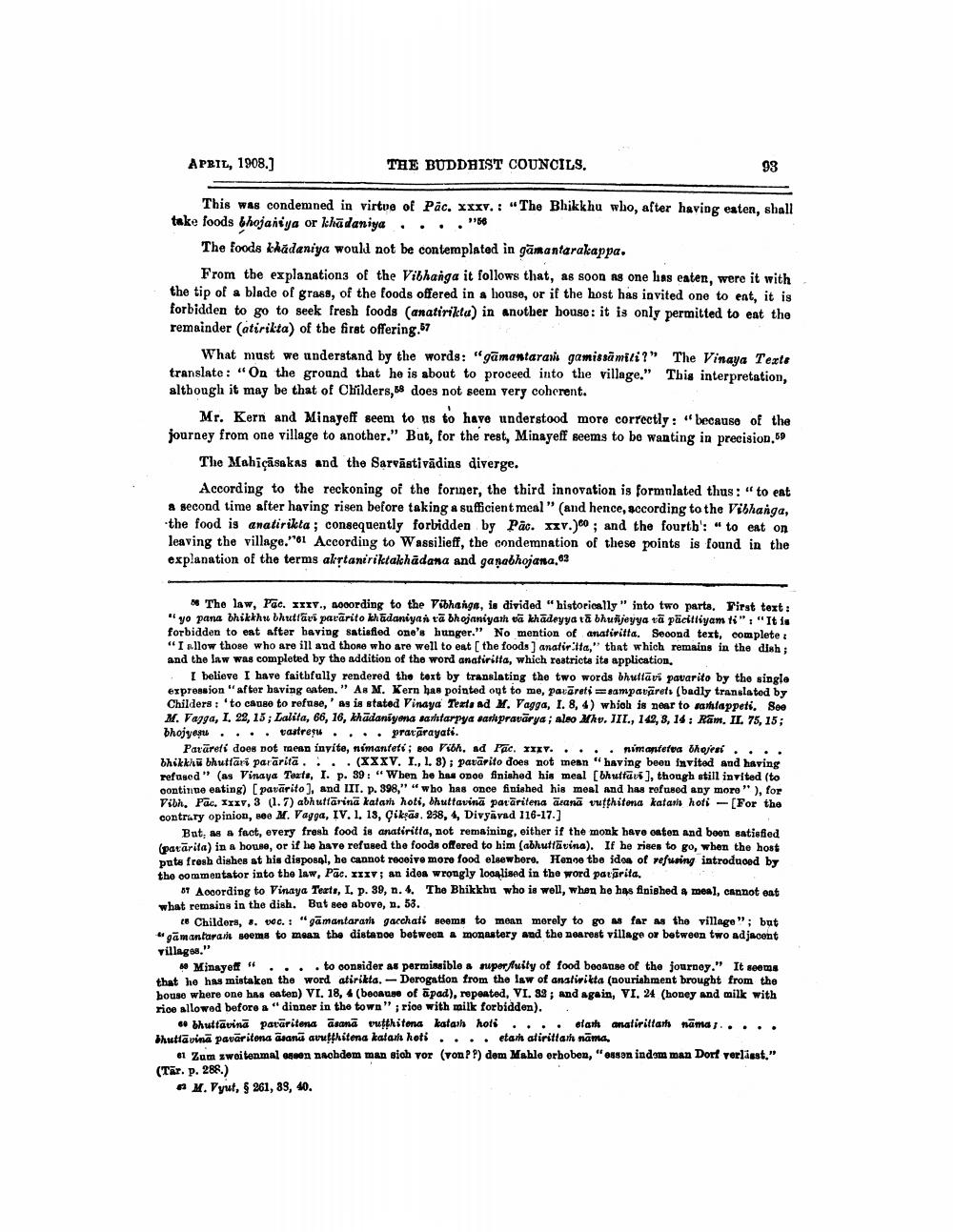________________
APRIL, 1908.)
THE BUDDHIST COUNCILS.
This was condemned in virtue of Pac. XXXV.: "The Bhikkhu who, after having eaten, shall take foods bhojaisya or khādaniya...."
The foods khádaniya would not be contemplated in gāmantarakappa.
From the explanations of the Vibhanga it follows that, as soon as one lins eaten, were it with the tip of a blade of grass, of the foods offered in a house, or if the host has invited one to ent, it is forbidden to go to seek fresh foods (anatirikta) in another bouso: it is only permitted to eat the remainder (atirikta) of the first offering.67
What must we understand by the words: "gamantararia gamissamiti?" The Vinaya Texts translate : "On the ground that he is about to proceed into the village." This interpretation, although it may be that of Childers, 58 does not seem very coherent.
Mr. Kern and Minayeff seem to us to have understood more correctly: "because of the journey from one village to another." But, for the rest, Minayeff seems to be wanting in precision 69
The Mahicāsakas and the Sarvāstivādins diverge.
According to the reckoning of the foriner, the third innovation is formulated thus: “to eat a second time after having risen before taking a sufficient meal" (and hence, according to the Vibhanga, -the food is anatirikta; consequently forbidden by Pac. XXV.)60; and the fourth': "to eat on leaving the village."1 According to Wassilieff, the condemnation of these points is found in the explanation of the terms akstaniriktakhadana and ganabhojana.02
* The law, Fac. IIIV., Socording to the Vibhanga, is divided "historically" into two parts. First text: "yo pana bhikkhu bhutlāvi pavārito khadaniyan tā bhojaniyar va khādeyya ta bhunjeyya tā pācitliyam ti", "It is forbidden to eat after having satisfied one's hunger." No mention of anatiritta. Seoond text, complete : "I allow those who are ill and those who are well to eat [the foods ) anatir Ita," that which remains in the dish; and the law was completed by the addition of the word anatiritta, which restricta ita application,
I believe I have faithfully rendered the text by translating the two words bhuttavi pavarito by the single expression "after having eaten." As M. Kern has pointed out to me, pavāreti sampavāretu (badly translated by Childers: 'to cause to refuse,' as is stated Vinaya Texto ad Y. Pagga, I. 8, 4) which is near to saslappets, See M. Vajga, 1, 22, 15; Lalita, 66, 16, khadaniyevi saxtarpya sanipravārya, alao Who. II., 142, 3, 14: Ram. IL. 75, 15; bhojyeu .... tastresu .... pratārayati.
Pararetí does not mean invite, nimanteli: 800 Vibh. ad Pac. IIIY..... primantefes bhojení .... whildh bhuttari parāritā... (XXXV. I., 1. 8); parārito does not mean "having been invited and having refused" (as Vinaya Toale, I. p. 89: "When he has once finished his meal (bhuffaus), though still invited (to continge eating) [ pavārito), and IIT. P. 398," "who has once finished his meal and has refused any more"), for Vilh. Pac. IIXV, 3 (1.7) abh ulārinā kalan hoti, bhuttavina patāritena dana vufthitona katarls hoti (For the contrary opinion, see M. Vayga, IV. 1, 13, Çikrās. 258, 4, Divyavad 116-17.)
But, fact, every fresh food is anatiritta, not remaining, either if the monk have onton and boon satisfied (patarita) in a house, or if he havo refused the foods offered to him (abhuttavina). If he rises to go, when the host wata frosh dishes at his disposol, he cannot receive more food elsewhere. Honge the idea of refwaing introduced by the commentator into the law, Pac. IIIV: an idea wrongly loolised in the word parārita.
31 According to Vinaya Teata, I. p. 39, n. 4. The Bhikkhu who is well, when he has finished a meal, cannot eat what remains in the dish. But see above, n. 53.
18 Childers, .. . "pamantararis gacchati seems to mean merely to go M far m the village"; but pamantara seems to mean the distadoo between a monastery and the nearest village or between two adjacent villagss."
Minsyel " ... to consider as permissible a superfuity of food boonuse of the journey." It seems that he has mistaken the word atirikta. -Derogation from the law of analivita (nourishment brought from the bouse where one has eaten) VI, 18, 4 (COALS of apad), repeated, VI. 89; and again, VI, 24 (honey and milk with rice allowed before a "dinner in the town"; rioo with milk forbidden).
# bhuttavinā pavāritena āsanā vulfitens katah hoti ... elar analirittar nāma..... bhutlāvinā paväritena avanü avufhitena katath hoti .... etash alirittach näma.
61 Zum zweitenmal geen nachdem man sich vor (von PP) dem Mable orboben, "esson indem man Dorf verliest." (Tär. p. 286.)
M. Vyut, $ 261, 89, 40.




